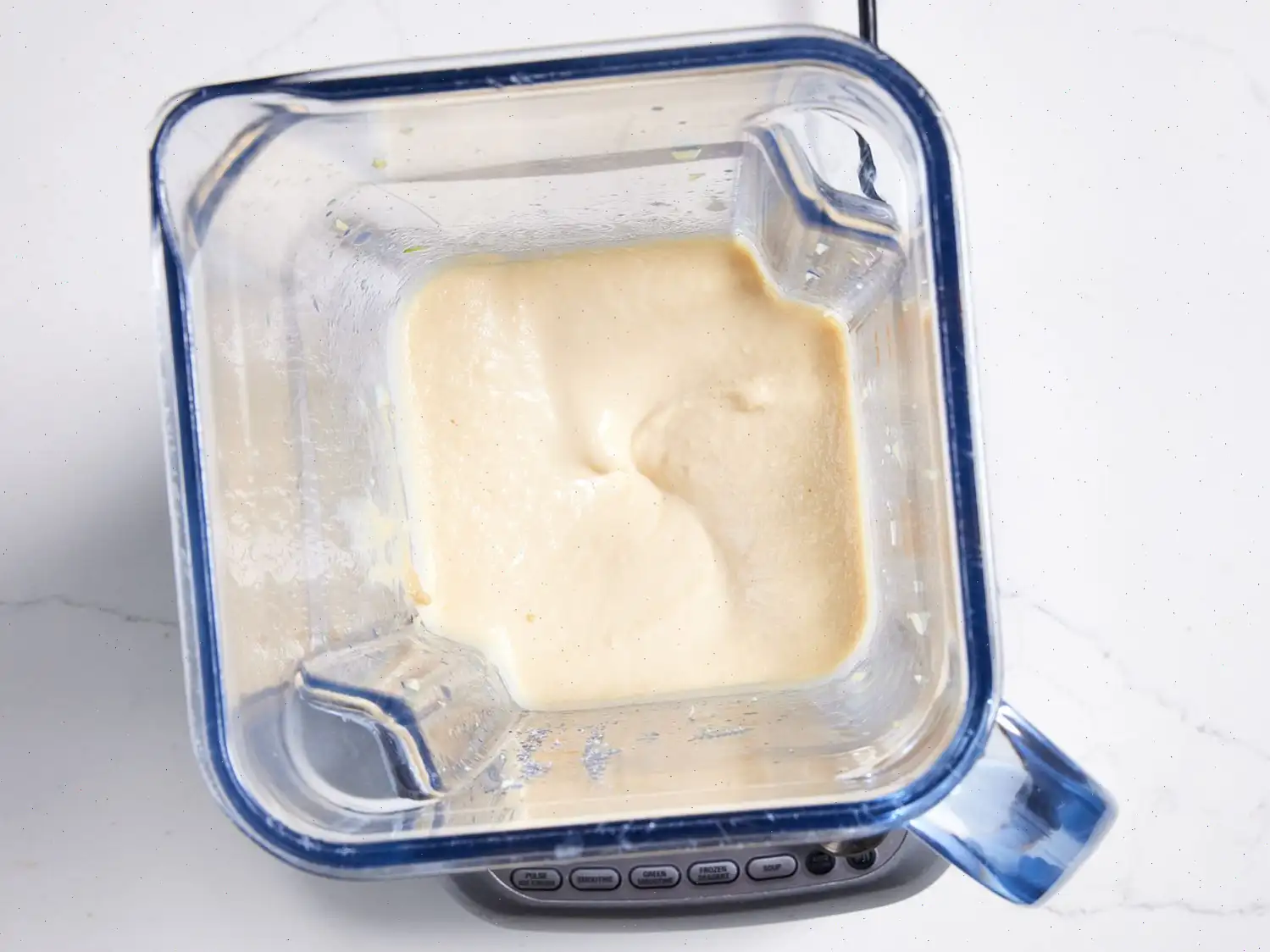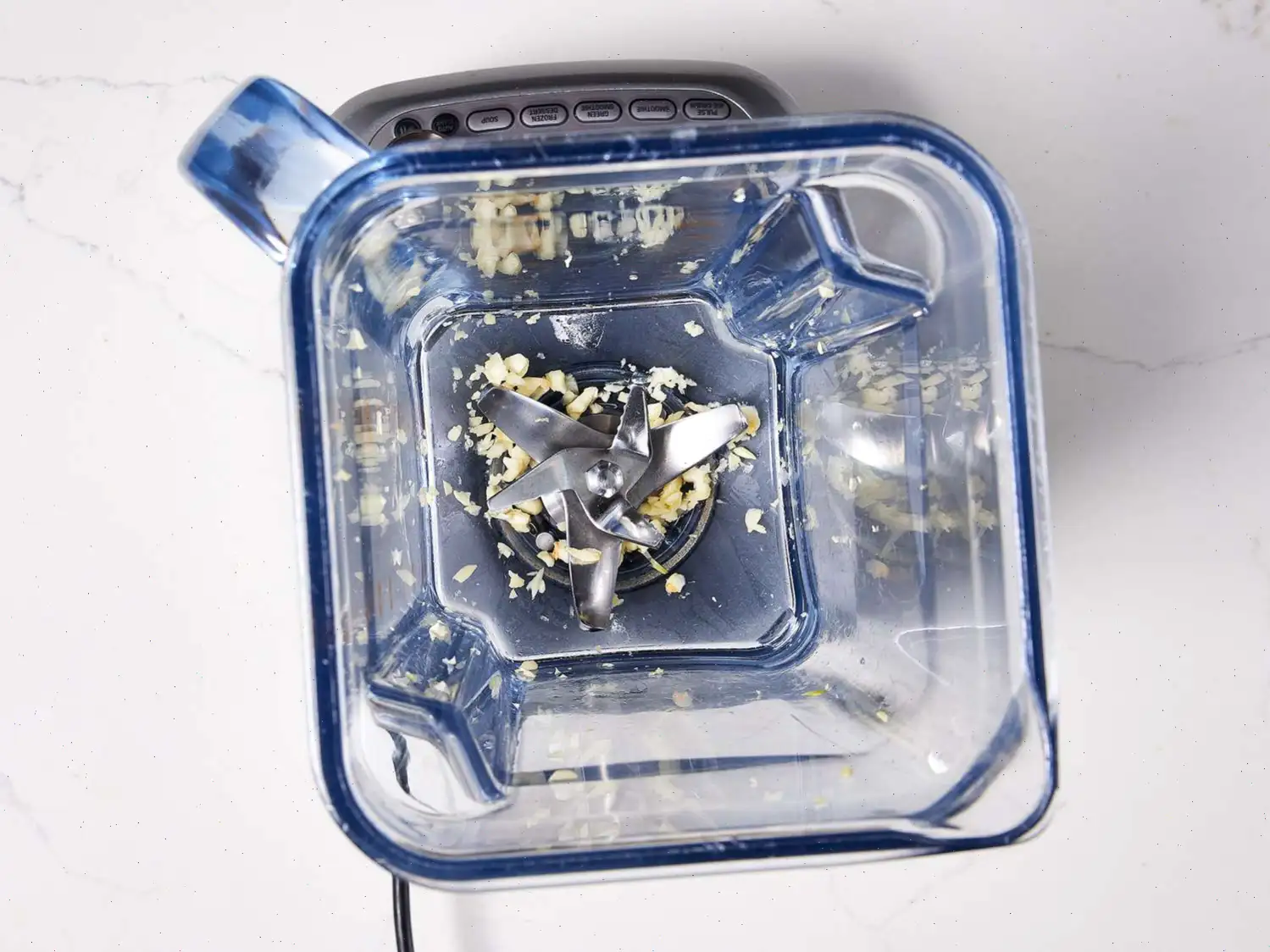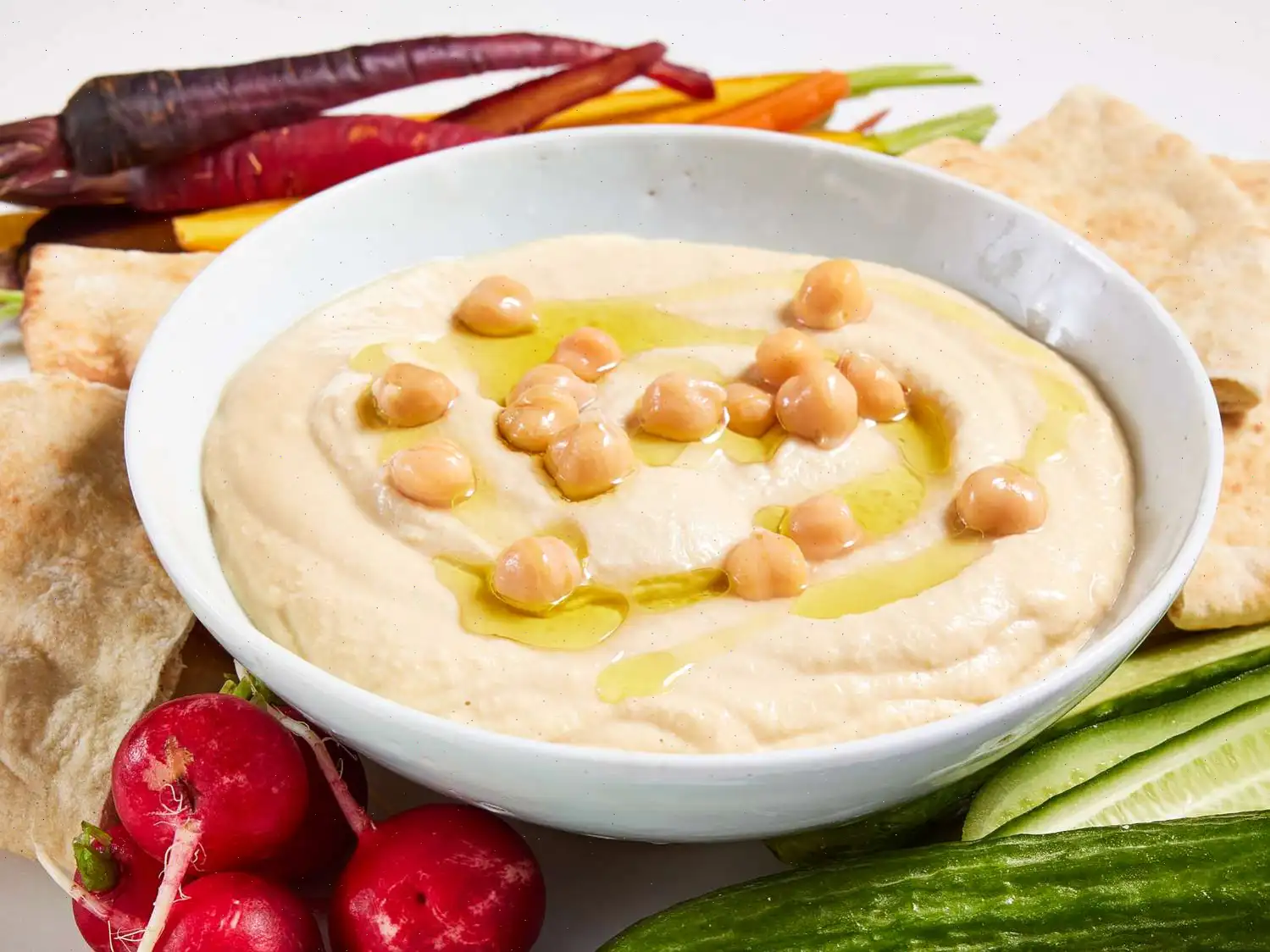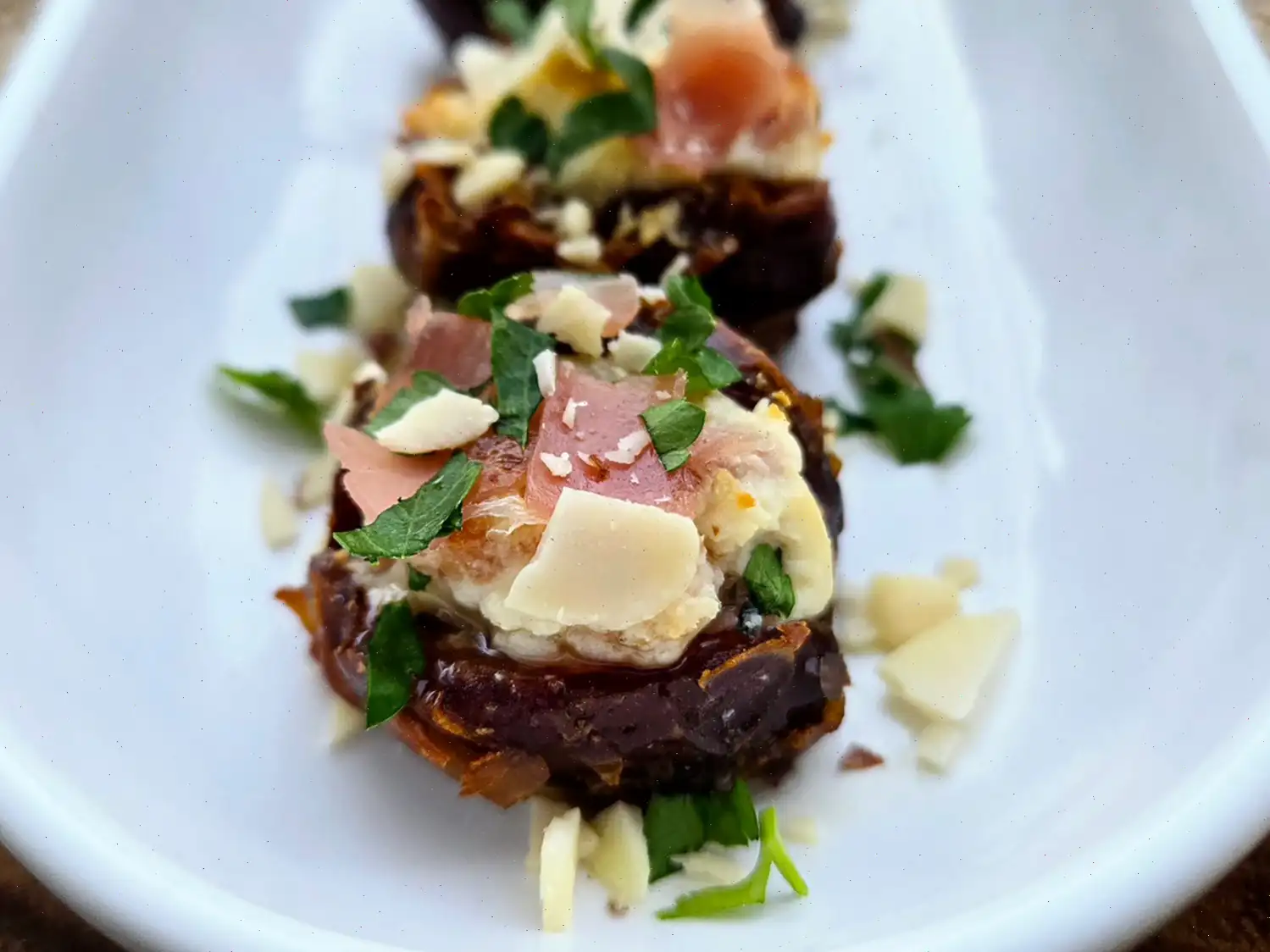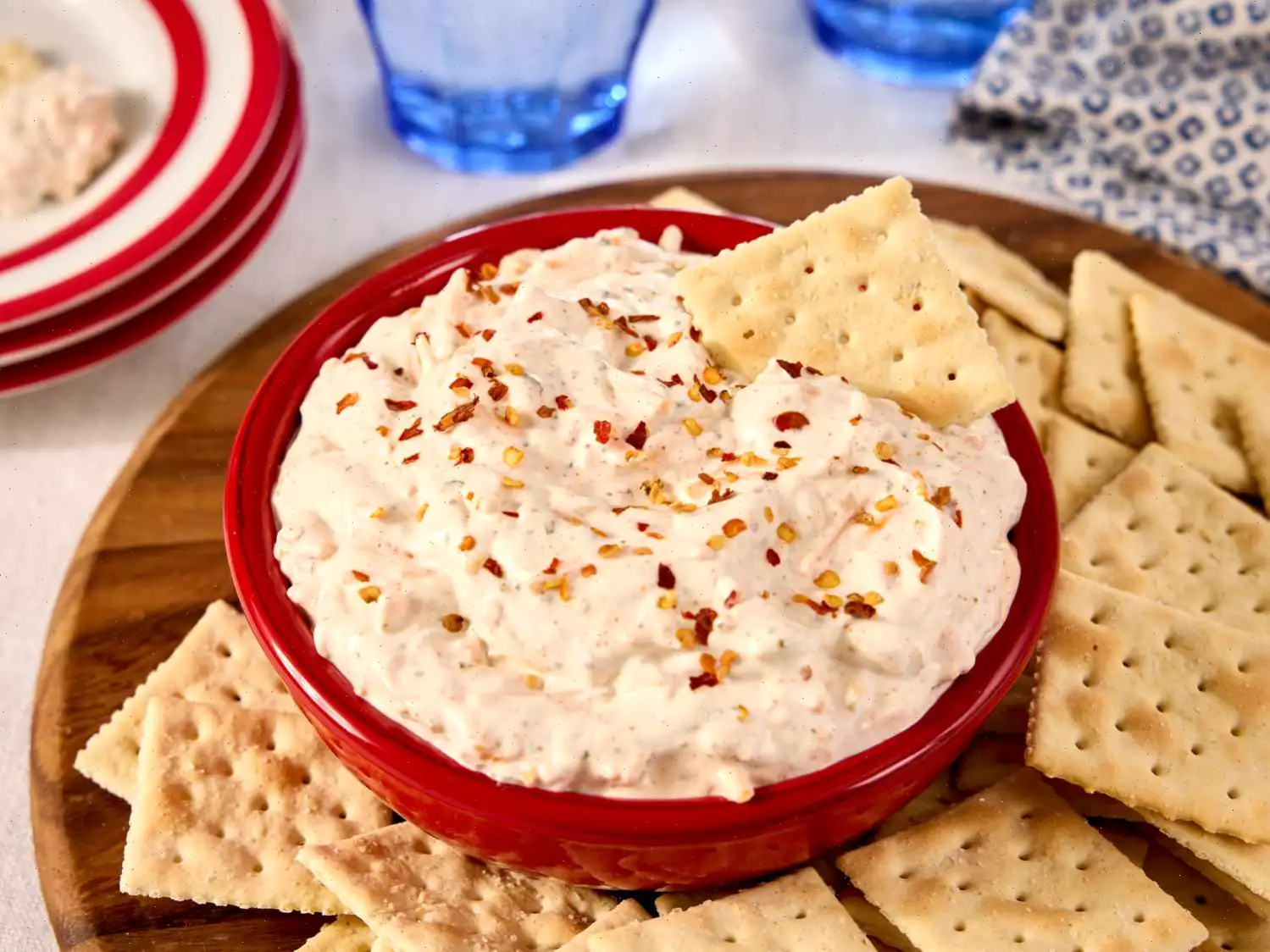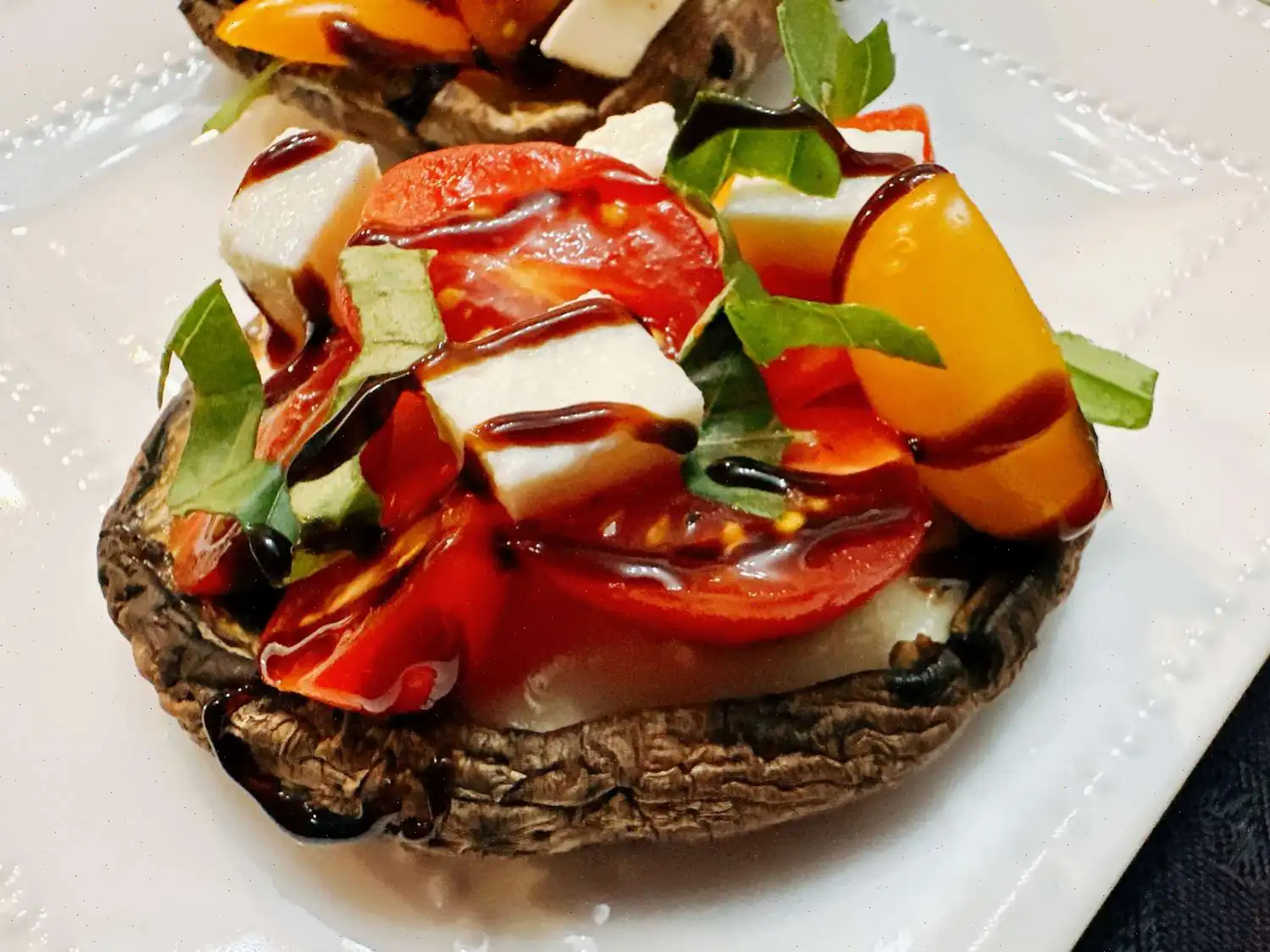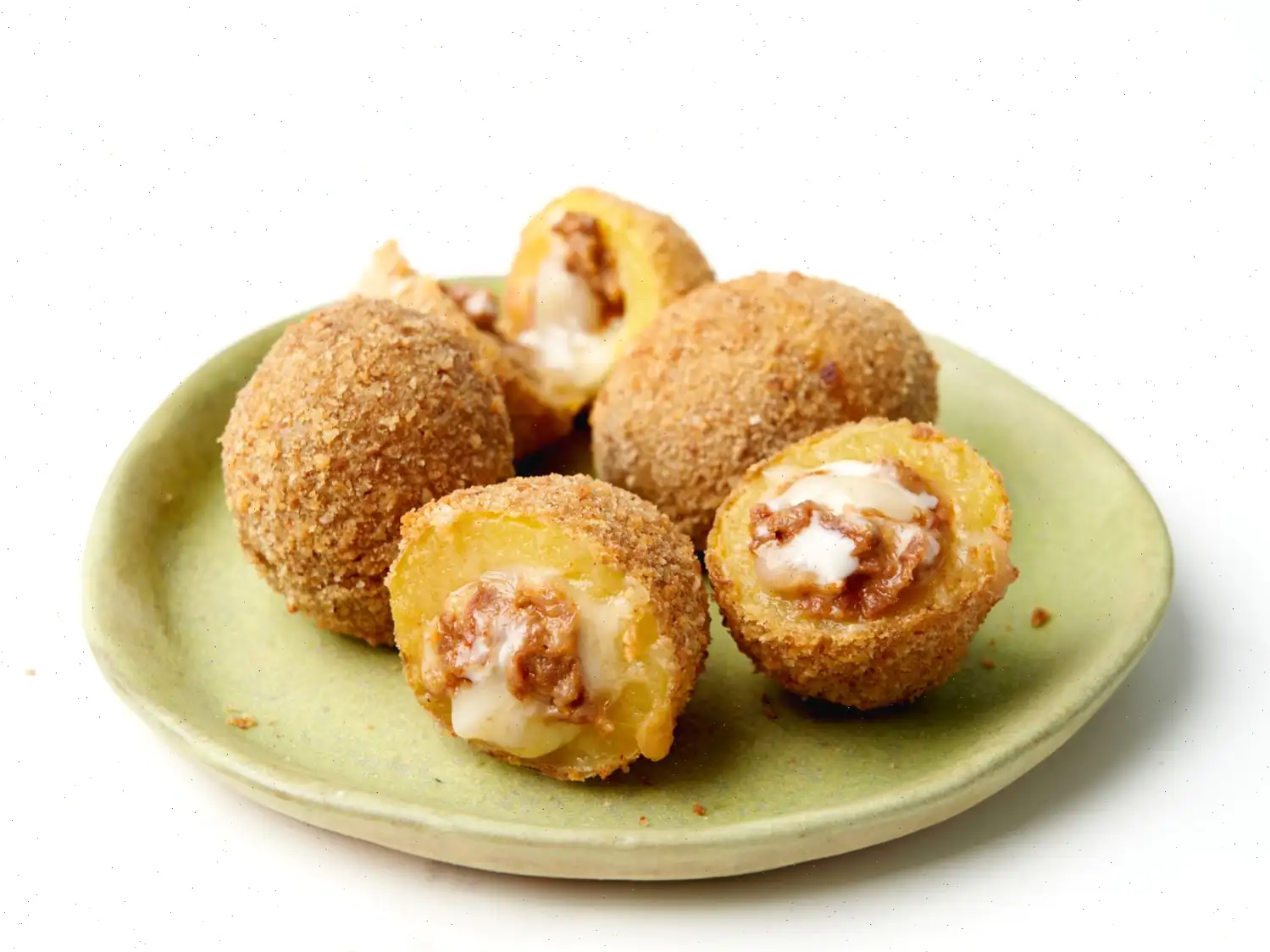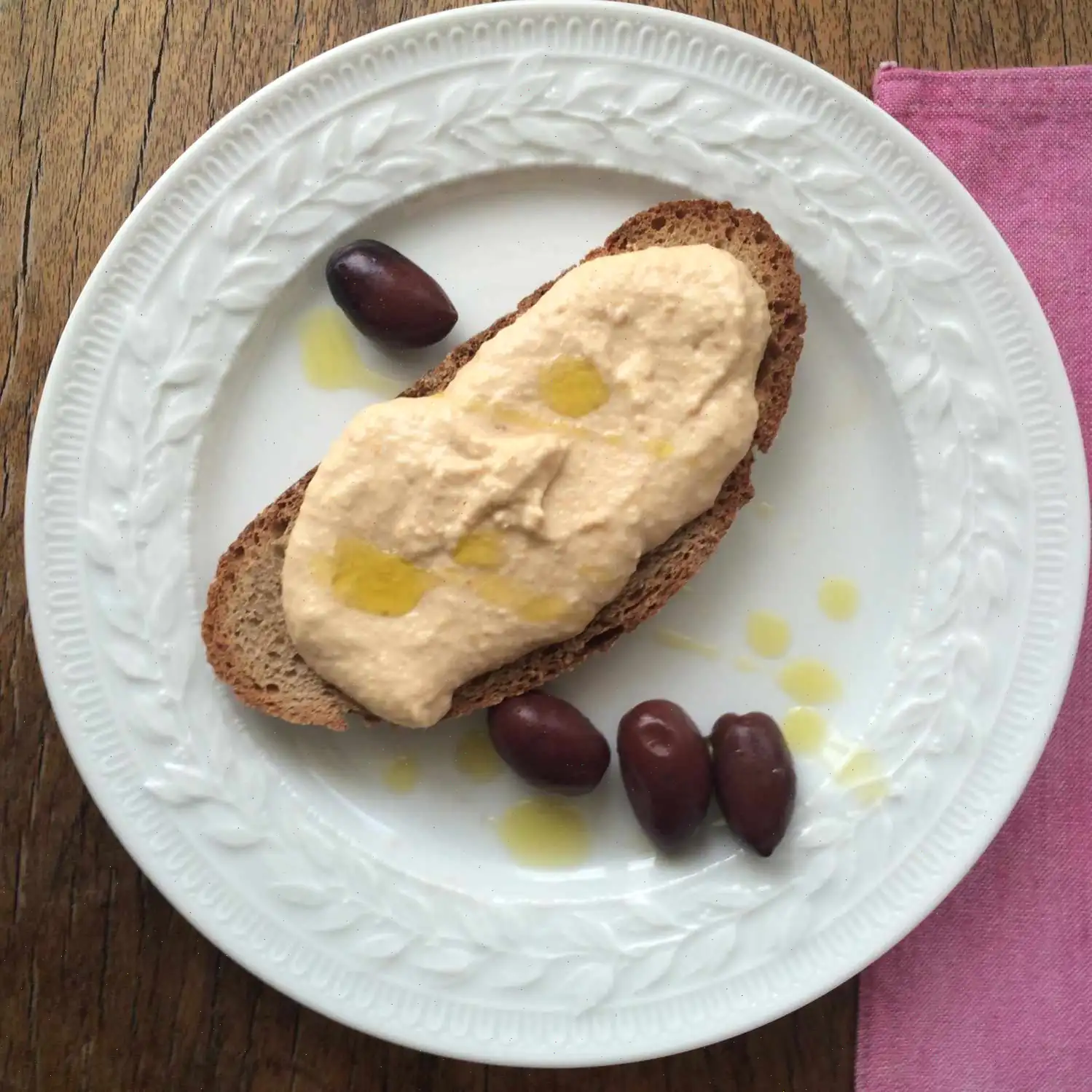
Real Hummus Recipe
Ingredients
- 2 cloves garlic
- 1 (19 ounce) can chickpeas, reserve half of the liquid
- 4 tablespoons lemon juice
- 2 tablespoons tahini
- 1 teaspoon salt, or to taste
- 2 tablespoons olive oil
- Black pepper to taste
Directions
Step 1: Start by chopping the garlic in a blender until finely minced.
Step 2: Add the chickpeas to the blender, but make sure to reserve about 1 tablespoon for garnish. Also, add the reserved chickpea liquid, lemon juice, tahini, and salt to taste.
Step 3: Blend everything together until the mixture is smooth and creamy.
Step 4: Transfer the blended hummus to a medium-sized serving bowl.
Step 5: Drizzle the olive oil over the top of the hummus, and then sprinkle black pepper to taste.
Step 6: Garnish with the reserved chickpeas for a finishing touch.
Nutrition Facts (per serving)
- Calories: 54
- Total Fat: 3g (3% of daily value)
- Saturated Fat: 0g (2% of daily value)
- Sodium: 199mg (9% of daily value)
- Total Carbohydrate: 7g (2% of daily value)
- Dietary Fiber: 1g (5% of daily value)
- Total Sugars: 0g
- Protein: 2g (3% of daily value)
- Vitamin C: 3mg (3% of daily value)
- Calcium: 16mg (1% of daily value)
- Iron: 1mg (3% of daily value)
- Potassium: 58mg (1% of daily value)
* Percent Daily Values are based on a 2,000 calorie diet. Your daily values may be higher or lower depending on your calorie needs.
** Nutrient information is not available for all ingredients. The data above is based on available nutrient information.
If you're following a medically restrictive diet, please consult with your doctor or registered dietitian before preparing this recipe.
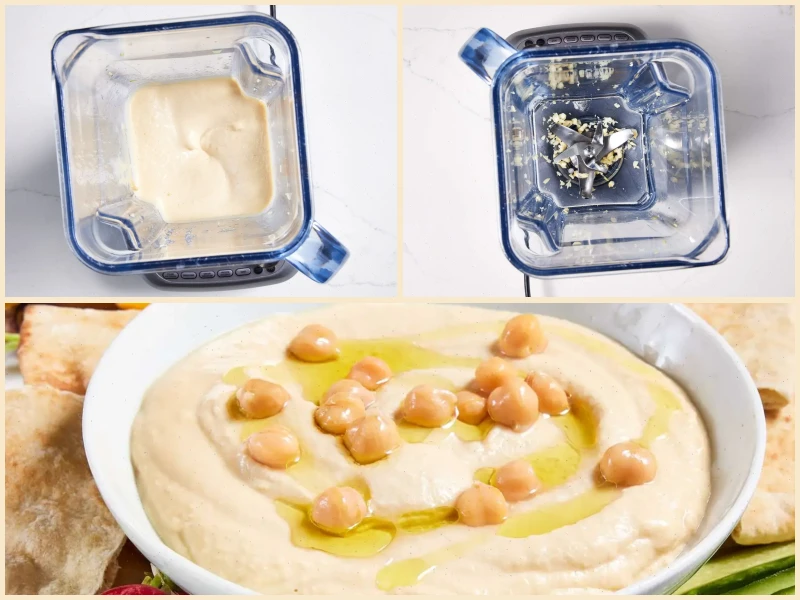

Origin and History of Hummus
Hummus, a creamy dip made from mashed chickpeas, tahini, olive oil, garlic, and lemon juice, is a staple of Middle Eastern cuisine. While its exact origins are debated, it is widely believed to have originated in the Levant region, encompassing modern-day countries like Lebanon, Syria, Jordan, Israel, and Palestine. Its history dates back at least to the 13th century, with the first written recipe for hummus appearing in a cookbook from the Ottoman Empire. Over time, hummus spread across the Middle East and beyond, becoming a beloved dish in many countries worldwide.
Regional Variations
While hummus is a traditional dish throughout the Middle East, different regions put their own twist on the classic recipe. In Lebanon, hummus is often served with a drizzle of olive oil and a sprinkle of pine nuts, while in Israel, it may be topped with chickpeas or hard-boiled eggs. In some parts of the Levant, hummus is served with spices such as cumin or paprika for added flavor. In Turkey, hummus might be accompanied by pickles or used as a spread in sandwiches.
Differences from Similar Dishes
Hummus is often confused with similar dishes like baba ghanoush, a smoky eggplant dip, or tahini-based spreads. However, the key difference lies in its main ingredient: hummus uses chickpeas (garbanzo beans) as its base, while baba ghanoush is made from roasted eggplants. Additionally, hummus typically has a creamier texture due to the inclusion of tahini, a sesame seed paste, whereas baba ghanoush has a chunkier, more fibrous texture. Both are popular dips, but hummus is renowned for its delicate, smooth flavor profile.
Where to Serve Hummus
Hummus is versatile and can be served as an appetizer, snack, or side dish. In the Middle East, it is often eaten as part of a mezze spread, a selection of small dishes that are shared among diners. It pairs wonderfully with pita bread, raw vegetables, or falafel. In many Western countries, hummus has gained popularity as a healthy snack option, often served with crackers, veggies, or used as a spread on sandwiches and wraps. Its versatility has made it a favorite in both casual and formal settings, from family dinners to restaurant menus.
Interesting Facts About Hummus
- In 2018, Lebanon attempted to set a world record for the largest serving of hummus, creating a dish weighing over 23,000 pounds!
- Hummus is considered a nutritious food, providing a good source of plant-based protein, fiber, and healthy fats. Its often part of vegetarian and vegan diets.
- Hummus has been a subject of political debate, with some countries claiming ownership over its invention. However, it remains a beloved dish that transcends borders.
- The word "hummus" comes from the Arabic word for chickpeas, "hummus," reflecting its primary ingredient.
Real Hummus Recipe
This classic hummus recipe is easy to make by blending chickpeas, garlic, tahini, and lemon for a wonderful homemade snack or appetizer.
Ingredients
- 2 cloves garlic
- 1 (19 ounce) can chickpeas, half the liquid reserved
- 4 tablespoons lemon juice
- 2 tablespoons tahini
- 1 teaspoon salt, or to taste
- 2 tablespoons olive oil
- Black pepper to taste
Instructions
- Chop garlic in a blender.
- Pour chickpeas into the blender, reserving about 1 tablespoon for garnish. Add reserved liquid, lemon juice, tahini, and salt to taste; blend until creamy and well mixed.
- Transfer mixture to a medium serving bowl. Drizzle olive oil and sprinkle pepper over the top. Garnish with reserved chickpeas.
Nutrition (per serving)
- Calories: 54
- Fat: 3g
- Carbs: 7g
- Protein: 2g
- Fiber: 1g
- Sodium: 199mg
FAQ about Real Hummus Recipe
Comments
Nicolle
10/06/2025 01:52:54 PM
This is a delicious recipe. I added a Tbsp of honey and used the whole lemon. I also toasted and ground whole cumin seeds for a super fresh flavour. Adjust salt to taste. I used only 1 Tbsp of olive oil for fat reduction, but I used extra virgin, so it still gave lots of flavour. Tips: 1 - some canned chick peas are slightly undercooked (crunchy) and should be boiled for 20 minutes or more before using (if you like a smooth texture). 2 - tahini goes rancid easily so buy it in a jar (not bulk) and keep it in the fridge. 3 - for easier digestion, discard the liquid in the can of chickpeas, rinse them, and use water for blending.
Beckerkorn
02/26/2007 11:19:54 PM
Really good. To make it better, use chickpeas that you've cooked at home. I use 2 cloves of garlic. By the way, this is the classic "five-point" recipe for hummus. Chickpeas, garlic, lemon juice, tahini, and olive oil. Anything else is a variation thereof.
Amy
01/29/2007 11:17:01 PM
A wonderful recipe! So easy! I make this about once a week. I use 2 15oz cans of beans, therefore I use about 4 heaping tbls of tahini, juice of 2 lemons (meyer lemons are so tasty in this); otherise I followed everything else as stated(the updated version). Sometimes I take the time to peel off the skins on the garbanzo beans...it does make a creamier texture but is really not that necessary...it tastes fantastic either which way...thanks for sharing!!UPDATE: I use one can garbonzos and one can black beans (rinsed and drained). With this I use only lime juice, otherwise all the same. AWSOME!! I never ever put olive oil on top....it's too perfect to dizzle oil on.
BarbJ
05/23/2010 03:35:21 PM
Very good basic Hummus recipe! I went with the updated version the author added. The only difference I made was similar to others; cooked the garlic before adding it. Raw garlic can be over powering. But roasting takes too long for me when I get a Hummus craving! Instead I put the garlic through a press and added it to about 2-3 tablespoons of water and simmered it on the stove in a small sauce pan for about 5 minutes. It takes the edge off. Then I added all of it, garlic and water to the Hummus in the blender. So good and yummy!!
naples34102
12/12/2012 05:47:33 PM
Mine was a 15 ounce can of garbanzo beans, so I adjusted the ingredients accordingly, including "to taste." We found we liked it as is, and also with about 1/2 tsp. of cumin. This of course would have been excellent with pita chips, but in an effort to come up with something a little healthier I topped 1/4" inch cucumber rounds with it, then with a dab of Greek yogurt and toasted sesame seeds. Delicious, guilt-free and attractive hummus appetizer!
Nelle
09/26/2006 01:18:01 PM
Both taste- & expensewise, this is a far better choice than store-bought hummus. As suggested, I used only 1/2 tsp salt, as well as added (to taste) some spices I had lying about (in this case, lemon pepper, nutmeg, ginger, coriander, and cumin). We don't have a blender, so I mashed the garbanzos and garlic together with a potato masher, poured in the liquid, and used an electric mixer (I added the garbanzo juice as I mixed until it looked/felt right). The result was a bit chunky, but not in a bad way. I feel like I might be one of only a few who hasn't got a blender, but if you don't, this can be amazing made without one.
Carol F
02/06/2019 08:39:47 PM
Delicious. I made my own tahini with 1/2 cup roasted sesame seeds toasted in a cast iron pan on the stove top, put in mini food processor, then add a little more than 1/8 cup olive oil. I also used dried chickpeas, soaked overnight, then boiled and simmered for 90 minutes. 19 oz is about 2 1/2 cups cooked. I used the liquid from cooking the chickpeas. I love the taste of fresh garlic and lemon juice and omitted the olive oil because it was already in the tahini. I like my hummus a little firmer with lots of garlic so I made it that way and this is delicious. I made whole wheat pitas too but they didn't turn out quite as well but together, yum.
csco
10/12/2020 01:15:39 AM
Used cumin and fresh garlic for seasoning. I’ve tried peeling the chickpeas, but found adding extra aqua fava was easier to reach a smooth consistency. Instead of canned beans, I cooked them on the stove for one and a half hours with 1/4 teaspoon of baking powder and 1/2 teaspoon of salt. The results were outstanding.
Holly Williams
04/13/2019 11:54:54 PM
Exceptional with some modifications. I modified to 4 cloves garlic, 4 tbsp tahini, and 1/4 tsp cumin; no black pepper. I cut back the lemon juice to 3 tbsp and salt to 1/4 tsp. With regards the method, I didn’t add in the reserved liquid until last and then added it in slowly until I got the consistency I wanted. I ended up using about 1/4 of the reserved liquid instead of 1/2.
wendy
09/18/2020 12:18:33 AM
This was pretty good though I did add about 1/2 tsp. cumin and next time will decrease the salt by half and go from there. I couldn't quite pinpoint if it was too salty or too lemony and I will decrease that also as it can, like salt, be added afterwards as needed. Easy, nutritious and tasty.
Stephinator Fortyfive
07/29/2020 07:54:50 PM
I added artichoke heart to mine. It gave it such a wonderful flavor! I need to make more. I used 2 cans chickpeas, 3 gloves garlic, juice from one lemon, cumin, paprika, green onion, chives and tahini.
David Dennis
09/03/2025 08:08:02 PM
Make this all the time! Love it
LockwoodNM
08/29/2025 03:40:10 AM
Very good made exactly as described. Next time I’ll decrease the salt to a 1/2 teaspoon, and use a bit less than half the liquid from the canned chickpeas. Quick, easy, and delicious
megg
07/24/2025 05:24:24 PM
Would be 5 stars but chickpeas, at least where I live, do not come in 19 ounce cans! Because of that I can't really judge what this recipe is supposed to taste like. Used the common 15.5 ounce can (which used to be 16 oz, but "shrinkflation.") Used 15.5 oz can, 1 large garlic clove, 1 whole lemon juiced, 2 tbsp tahini and olive oil, 1 tsp salt. Topped with fresh ground pepper. Very good, but not the recipe. Also I would blend most of the olive oil in next time and save a little to drizzle on top with the pepper.
Linda Sable
06/03/2025 07:41:39 PM
The addition of garlic or lemon is a personal taste. If it's too thick add some of the liquid from the can.
Smee
05/16/2025 07:08:02 PM
The flavor is really good. Use 2 1/3 cup chickpeas and 2 Tbls of the chickpea liquid, 1/2 teaspoon salt.
Ruth Taylor
04/03/2025 01:05:19 PM
Made it for dinner — gone in minutes!
LoyalOnion1886
02/16/2025 06:27:40 PM
Lebanese Zaatar is also a fantastic spice to add to your hummus.
FeistyMug9862
01/26/2025 09:14:35 PM
Way too much lemon
Camille
01/24/2025 07:43:54 PM
I made this using the author's additional update and it came out fantastic!


